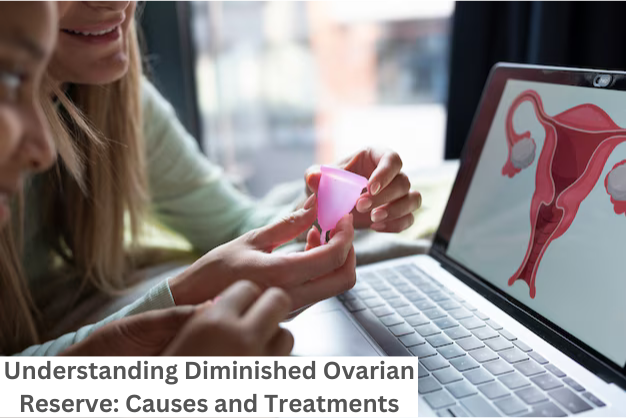Understanding Diminished Ovarian Reserve: Causes and Treatments
Diminished Ovarian Reserve is a condition that refers to a decrease in the number and quality of a woman’s eggs, which can significantly impact her fertility. It is a common concern among women trying to conceive, especially as they age. Understanding Diminished Ovarian Reserve, its causes, and the available treatments is crucial for anyone experiencing difficulties in conceiving.
What is Diminished Ovarian Reserve?
Diminished Ovarian Reserve Diminished Ovarian Reserve is a condition where a woman's ovaries have a reduced number and/or quality of eggs. This can make it difficult or impossible to conceive naturally. DOR is often associated with aging, but it can also be caused by other factors.
Causes of Diminished Ovarian Reserve
Several factors can contribute to Diminished Ovarian Reserve, including:
Age: The quality and quantity of eggs naturally decline as a woman ages. This is the most common cause of DOR.
Genetics: Some women are genetically predisposed to Diminished Ovarian Reserve. This may be due to family history of early menopause or other fertility issues.
Medical treatments: Chemotherapy, radiation, and certain surgeries can damage the ovaries and lead to DOR.
Autoimmune disorders: Conditions such as lupus and rheumatoid arthritis can affect the ovaries and reduce egg quality.
Lifestyle factors: Smoking, excessive alcohol consumption, and exposure to toxins can also contribute to DOR.
Symptoms of Diminished Ovarian Reserve
Diminished Ovarian Reserve can be difficult to diagnose because it often doesn't cause any noticeable symptoms. However, some women may experience:
Irregular periods: This may include missed periods, shorter cycles, or heavier bleeding.
Difficulty conceiving: This may be due to fewer eggs or lower egg quality.
Early menopause: This is when menopause occurs before the age of 40.
Diagnosis of Diminished Ovarian Reserve
If you are concerned about Diminished Ovarian Reserve, your doctor may recommend the following tests:
Antral follicle count (AFC): This ultrasound test measures the number of antral follicles, which are small fluid-filled sacs that contain immature eggs.
Anti-Müllerian hormone (AMH) test: This blood test measures the level of AMH, a hormone produced by the ovaries.
Estradiol test: This blood test measures the level of estradiol, a hormone produced by the ovaries.
Day 3 follicle-stimulating hormone (FSH) test: This blood test measures the level of FSH, a hormone that stimulates the ovaries to produce eggs.
Treatment of Diminished Ovarian Reserve
There is no cure for Diminished Ovarian Reserve, but there are several treatment options available to help women with Diminished Ovarian Reserve conceive. The best treatment option for you will depend on your individual circumstances.
Conclusion
Diminished Ovarian Reserve is a condition that many women face as they age, but it is not the end of the road for those wishing to conceive. While the diagnosis of Diminished Ovarian Reserve can be disheartening, there are various treatment options available that can help increase the chances of pregnancy. Seeking guidance from a fertility specialist, such as those at New World Fertility Centre in Delhi, is essential to understand your specific situation and explore the best options for treatment. Early diagnosis and intervention can make a significant difference in achieving your family-building goals.
Frequently Asked Questions (FAQs)
1. What is Diminished Ovarian Reserve?
Diminished Ovarian Reserve refers to a decrease in the number and quality of eggs in a woman's ovaries. This condition can affect fertility, making it harder to conceive.
2. What are the main causes of Diminished Ovarian Reserve?
Diminished Ovarian Reserve is most commonly caused by aging, genetic factors, medical conditions such as endometriosis or PCOS, ovarian surgeries, chemotherapy or radiation, and lifestyle factors like smoking or excessive alcohol consumption.
3. How do I know if I have Diminished Ovarian Reserve?
Diminished Ovarian Reserve is typically diagnosed through blood tests to measure hormone levels (like AMH, FSH, and estradiol) and ultrasounds to assess follicle count and ovarian health. Antral Follicle Count (AFC) is also used to evaluate ovarian reserve.
4. Can Diminished Ovarian Reserve be treated?
While Diminished Ovarian Reserve cannot be fully reversed, several treatments can improve fertility outcomes, including In Vitro Fertilization (IVF), egg donation, egg freezing, platelet-rich plasma (PRP) therapy, and hormonal supplements.
5. Is age the only factor that affects ovarian reserve?
No, while age is the most significant factor, other factors like genetics, medical conditions (endometriosis, PCOS), ovarian surgeries, and lifestyle choices (smoking, obesity) can also play a role in diminished ovarian reserve.

 Nov-09-2024
Nov-09-2024